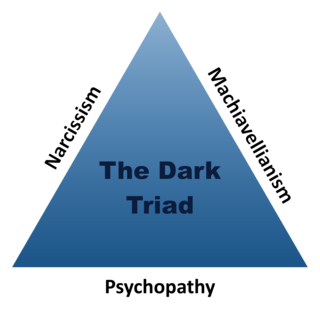Related Research Articles
Self-esteem is an individual's subjective evaluation of their own worth. Self-esteem encompasses beliefs about oneself as well as emotional states, such as triumph, despair, pride, and shame. Smith and Mackie (2007) defined it by saying "The self-concept is what we think about the self; self-esteem, is the positive or negative evaluations of the self, as in how we feel about it."
Narcissistic personality disorder (NPD) is a mental disorder characterized by a life-long pattern of exaggerated feelings of self-importance, an excessive craving for admiration, and a diminished ability to empathize with others' feelings. Narcissistic personality disorder is one of the eleven sub-types of the broader category known as personality disorders.

HSN, an initialism of its former name Home Shopping Network, is an American free-to-air television network owned by the Qurate Retail Group, which also owns catalog company Cornerstone Brands. Based in the Gateway area of St. Petersburg, Florida, United States, the home shopping channel has former and current sister channels in several other countries.

Perfectionism, in psychology, is a broad personality style characterized by a person's concern with striving for flawlessness and perfection and is accompanied by critical self-evaluations and concerns regarding others' evaluations. It is best conceptualized as a multidimensional and multilayered personality characteristic, and initially some psychologists thought that there are many positive and negative aspects. Perfectionism drives people to be concerned with achieving unattainable ideals or unrealistic goals, often leading to many forms of adjustment problems such as depression, anxiety, OCD, low self-esteem, suicidal thoughts and tendencies and a host of other psychological, physical, relationship, and achievement problems in children, adolescents, and adults, although perfectionist sights can reduce stress, anxiety, and panic. Recent data complied by British psychologists Thomas Curran and Andrew Hill show that perfectionistic tendencies are on the rise among recent generations of young people.

Narcissism is a self-centered personality style characterized as having an excessive interest in one's physical appearance and an excessive pre-occupation with one's own needs, often at the expense of others.
Malignant narcissism is a psychological syndrome comprising an extreme mix of narcissism, antisocial behavior, aggression, and sadism. Grandiose, and always ready to raise hostility levels, the malignant narcissist undermines families and organizations in which they are involved, and dehumanizes the people with whom they associate.
In psychology, discriminant validity tests whether concepts or measurements that are not supposed to be related are actually unrelated.
The narcissism of small differences is the thesis that communities with adjoining territories and close relationships are especially likely to engage in feuds and mutual ridicule because of hypersensitivity to details of differentiation. The term was coined by Sigmund Freud in 1917, based on the earlier work of British anthropologist Ernest Crawley. In language differing only slightly from current psychoanalytic terminology, Crawley declared that each individual is separated from others by a taboo of personal isolation, a narcissism of minor differences.

In psychology, the dark triad comprises the personality traits of narcissism, Machiavellianism, and psychopathy. They are called dark because of their malevolent qualities.
In the field of psychology, the term grandiosity refers to an unrealistic sense of superiority, characterized by a sustained view of one's self as better than others, which is expressed by disdainfully criticising them, overinflating one's own capability and belittling them as inferior; and refers to a sense of personal uniqueness, the belief that few other people have anything in common with oneself, and that one can only be understood by a few, very special people. The personality trait of grandiosity is principally associated with narcissistic personality disorder (NPD), but also is a feature in the occurrence and expression of antisocial personality disorder, and the manic and hypomanic episodes of bipolar disorder.
The Narcissistic Personality Inventory (NPI) was developed in 1979 by Raskin and Hall, and since then, has become one of the most widely utilized personality measures for non-clinical levels of the trait narcissism. Since its initial development, the NPI has evolved from 220 items to the more commonly employed NPI-40 (1984) and NPI-16 (2006), as well as the novel NPI-1 inventory (2014). Derived from the DSM-III criteria for Narcissistic personality disorder (NPD), the NPI has been employed heavily by personality and social psychology researchers.
In social psychology, collective narcissism is the tendency to exaggerate the positive image and importance of a group to which one belongs. The group may be defined by ideology, race, political beliefs/stance, religion, social class, language, nationality, employment status, education level, cultural values, or any other ingroup. While the classic definition of narcissism focuses on the individual, collective narcissism extends this concept to similar excessively high opinions of a person's social group, and suggests that a group can function as a narcissistic entity.
An individual's or community's religious orientation involves presumptions about the existence and nature of God or gods, religious prescriptions about morality and communal and personal spirituality. Such presumptions involve the study of psychology, ethics, sociology and anthropology.
Narcissistic defenses are those processes whereby the idealized aspects of the self are preserved, and its limitations denied. They tend to be rigid and totalistic. They are often driven by feelings of shame and guilt, conscious or unconscious.
The Honesty-Humility factor of the HEXACO model of personality is one of the six basic personality traits. Honesty-humility is a basic personality trait representing the tendency to be fair and genuine when dealing with others, in the sense of cooperating with others. Even when someone might utilize them without suffering retaliation. People with very high levels of the Honesty-Humility avoid manipulating for personal gain, feel little desire to break rules, are uninterested in crazy wealth and luxuries, and feel no special right to elevated social status. Conversely, persons with very low levels on this scale will compliment others to get whatever they want, are inclined to break the rules for personal gains, are motivated by material gain, and feel a strong sense of self-importance.
Delroy L. Paulhus is a personality psychology researcher and professor. He received his doctorate from Columbia University and has worked at the University of California, Berkeley and the University of California, Davis. Currently, Paulhus is a professor of psychology at the University of British Columbia in Vancouver, Canada where he teaches undergraduate and graduate courses.
Narcissism in the workplace can become an issue that may have a major impact on an entire organization. Often beginning with manipulation during the interview process, to engaging in counterproductive work behavior. Narcissism is both a personality trait and a personality disorder, generally assessed with the Narcissistic Personality Inventory. Owing to these differences from typical workplace behaviors, Psychologists have studied the interview strategies of narcissists, their impact on coworkers, correlated behaviors, motivations, and preferences. Following these investigations, many have offered insight into the best practices when working with a narcissist, and perhaps some amount of benefit stemming from some of their behaviors.
Covert facial recognition is the unconscious recognition of familiar faces by people with prosopagnosia. The individuals who express this phenomenon are unaware that they are recognizing the faces of people they have seen before.
The Dark Triad Dirty Dozen (DTDD) is a brief 12-question personality inventory test to assesses the possible presence of three co-morbvid socially maladaptive, dark triad traits: Machiavellianism, narcissism, and psychopathy. The DTDD was developed to identify the dark triad traits among subclinical adult populations. It is a screening test. High scores on the DTDD do not necessary correlate with clinical diagnoses.

In the field of personality psychology, Machiavellianism is a personality trait centered on manipulativeness, callousness, and indifference to morality. Though unrelated to the historical figure or his works, the trait is named after the political philosophy of Niccolò Machiavelli, as psychologists Richard Christie and Florence Geis used edited and truncated statements inspired by his works to study variations in human behaviors. Their Mach IV test, a 20-question, Likert-scale personality survey, became the standard self-assessment tool and scale of the Machiavellianism construct. Those who score high on the scale are more likely to have a high level of deceitfulness and an unempathetic temperament.
References
- 1 2 Hendin, Holly M., and Jonathan M. Cheek. "Assessing hypersensitive narcissism: A reexamination of Murray's Narcism Scale." Journal of Research in Personality 31.4 (1997): 588-599.
- ↑ Eamonn Patrick Arble. "Evaluating the Psychometric Properties of the Hypersensitive Narcissism Scale: Implications for the Distinction of Covert and Overt Narcissism".